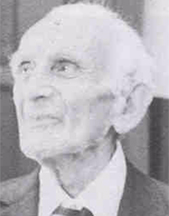1891 – 1984
Influenced international nature of social reform
As a teacher, writer, practitioner, scholar, and community leader, Walter Friedlander�s contributions to the field of social work and to social work education were significant and influential. Thousands of students worldwide received their basic understanding of the field through his writings, influence, and teaching.
Admitted to the Berlin Bar in 1921, Friedlander practiced law briefly, then was appointed to a post in the Potsdam Juvenile Court. Soon after, he was elected to the Berlin City Council from one of the city’s largest and poorest districts. Assigned supervision over municipal child welfare, he instituted innovative programs serving the needs of unemployed youth, juvenile delinquents, and children of unemployed and incapacitated mothers. Simultaneously, he served on the faculty of the Berlin School of Social Work.
In 1933, with Hitler’s rise to power, Friedlander’s career as a public servant ended. As a member of the Weimar government, he was persona non grata in the Third Reich. When the Nazi police came to his office to arrest him, he was fortunately attending a meeting elsewhere. His co-workers managed to get word to him not to return to the office. He turned around and never went back. Soon after, he managed to travel with his wife and daughter to Switzerland. He then went to France, where he became executive director of the Paris-based Social and Legal Services to German Refugees.
While in Berlin, Friedlander was visited by Grace Abbott, professor at the University of Chicago’s School of Social Service Administration. His work was called to the attention of Edith Abbott, Chicago’s dean. With her sponsorship, Friedlander obtained a lectureship at the University of Chicago, enabling him to enter the United States with his family in 1936.
In 1943, Professor Harry Cassidy invited Friedlander to the Berkeley campus as a lecturer. He became associate professor in 1948, professor in 1955, and emeritus professor in 1959. Friedlander’s major course at Berkeley was his undergraduate survey of the broad field of social welfare. It was the origin of his popular book, Introduction to Social Welfare, which has been republished in five editions and translated into 10 languages.
Friedlander received numerous honors in his lifetime. In 1984 his friends and colleagues created The Walter Friedlander fund to Promote Education in International social Welfare. The fund sponsors, among other projects, an annual lecture at Berkeley by someone who has contributed significantly to international social welfare.
